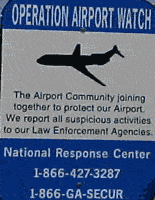In recent testimony before the U.S. House Subcommittee on Government Management, Organization and Procurement, Rob Zivney called implementation of HSPD-12 a pioneering effort which will require both a financial investment and development of new infrastructure.

When hurricanes in 2005 leveled the Charlotte County Airport in Punta Gorda, Fla., airport officials chose to rebuild, and to do so stronger and smarter. That meant making sure the airport’s security system satisfied federal and state regulations in a post-9/11 world that had to protect against potential terrorists turning airplanes into deadly bombs.
- By Debbie Bolles
- Apr 08, 2008

Immigration is one of those controversial issues that touch on many aspects of American life. It's challenging because on one hand, there are those who come to the United States to seek a better life. But in doing so, they are breaking the law. Three people believe they have the answers to resolve this issue, and oddly enough, all three want to be president of the United States.
- By Ralph C. Jensen
- Apr 02, 2008
More than 900 federal, state and local law enforcement and homeland security officials recently attended the National Fusion Center Conference in Washington, D.C. to further the U.S. government’s plans to create a seamless network of these centers.
Officials from the United States and Germany recently initialed a bilateral agreement related to sharing access to biometric data and spontaneous sharing of data about known and suspected terrorists.
Cyber Storm II is the second in a series of congressionally mandated exercises that will examine the nation’s cyber security preparedness and response capabilities. The exercise will simulate a coordinated cyber attack on information technology, communications, chemical, and transportation systems and assets.
The associations joined in an amicus brief urging the 10th Circuit Court of Appeals to agree that the Oklahoma statute, by forcing employers to allow guns such as this Beretta, runs afoul of the General Duty Clause.
One of the first reactionary attempts to bolster security after 9/11 occurred at airports. Immediately after air service was reinstated, the public saw uniformed Marines armed with M-16s at every security checkpoint, concrete barriers at each entry point, security guards ransacking passengers’ luggage and, of course, taller fences going up around airfield perimeters. As with most things in life, an unexpected event usually generates an unexpected— and sometimes irrational— response. Such was the case with the nation’s aviation facilities.
- By Barry Willingham
- Mar 03, 2008

Mention border security, and you might imagine the intersection of two countries, or perhaps the border separating government facilities from private land. But border security also can be defined as perimeter security, which expands the concept to encompass walls, fences, roads and other perimeters around businesses, schools, prisons, utilities, research facilities, and other properties and buildings.
- By John Monti
- Mar 01, 2008
A rapid way to spot insider threats from individuals within an organization such as a multinational company or military installation is reported in the current issue of the International Journal of Security and Networks.
The Department of Homeland Security (DHS) announced recently that it will further advance the department’s Homeland Security Presidential Directive-12 (HSPD-12) goals by awarding contracts to three companies.
The Federal Bureau of Investigation recently awarded Lockheed Martin a 10-year, $1 billion contract to develop and maintain the Bureau's Next Generation Identification (NGI) system, a multi-modal, state-of-the-art biometrics system for use by state, local and federal authorities.
An interagency subcommittee of the White House's National Science and Technology Council (NSTC) issued a draft document recently that lists recommended standards to enable government agencies to easily share biometric data.
Sure, it's just a TV show, but a University of Iowa law professor says 24 can have real-world legal implications
The Department of Homeland Security (DHS) recently announced an increase in the total amount of funding available for REAL ID implementation and an extension in the deadline for FY 2008 REAL ID Demonstration Grant Program applications.
The final rule for REAL ID compliance provides the necessary guidance for states to begin building systems and linking networks to fulfill the mandates of the 2005 legislation, according to a newly released report by INPUT.

The Federal Energy Regulatory Commission (FERC) recently approved eight new mandatory critical infrastructure protection (CIP) reliability standards to protect the nation’s bulk power system against potential disruptions from cyber security breaches.
McAfee Inc. recently presented the McAfee Cybercrime Fighter Award to Gregory T. Garcia, Assistant Secretary for Cyber Security and Communications at the Department of Homeland Security.
The Department of Homeland Security recently released the National Response Framework, successor to the National Response Plan.

The average small-business owner may view the world of federal government contracts as an intimidating, mind-boggling realm dominated by huge corporations— with the promise of great financial success just out of reach. However, breaking into the federal government marketplace is a feat that can be accomplished by small private companies—and one that has been achieved by countless organizations, especially in recent years.
- By Megan Weadock
- Jan 07, 2008